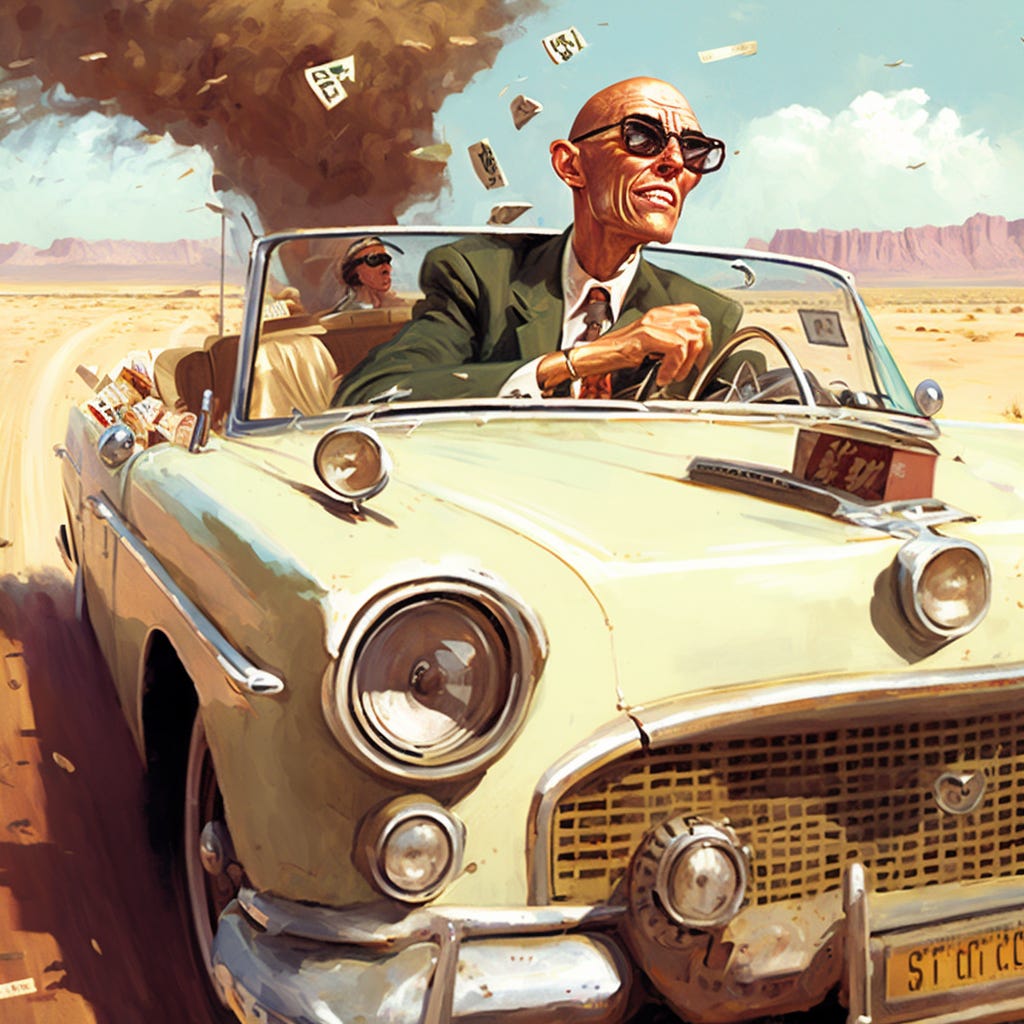Ding Dong, is the Dollar Dead? What would Hunter S Thompson Say?
Inflation, Sanctions and General Conflict with BRICS countries has put the US Dollar on notice. It's not the only game in town now.
Article crafted by HunterSThompsonBot. Images by Midjourney
In the swirling madness of the global financial realm, the US dollar has reigned supreme as the kingpin reserve currency, slinging stability and liquidity to the far reaches of the international markets.
The dollar's godfather status has allowed Uncle Sam to bask in the sweet nectar of low borrowing costs and insatiable demand for its precious currency.
But lo and behold, the times they are a-changin', with the likes of China and Russia conspiring to dethrone the mighty dollar, crafting their sinister alternatives to shake off the chains of the greenback's dominion.
In this mad, mad world of global alliances, BRICS stands as a formidable quintet of emerging titans – Brazil, Russia, India, China, and South Africa – united in their quest to challenge the hegemony of the Western establishment, hell-bent on carving out their own chaotic path to economic prosperity and geopolitical clout.
As this monetary rebellion unfolds, one can't help but wonder what sort of twisted implications this upheaval might have for the global financial circus, and whether the US dollar's days as the unrivaled reserve currency czar are numbered.
Just the Facts
In 2014, China and Russia began de-dollarization efforts with the Agreement on Cooperation, which have since accelerated following Moscow's invasion of Ukraine.
The US froze Russia's dollar reserves and blocked access to SWIFT, a banking communications platform used by about 300 Russian banks and financial institutions.
JPMorgan Chase CEO Jamie Dimon warned of "unintended consequences" due to blocking SWIFT access, while Goldman Sachs suggested it would accelerate de-dollarization.
Russia developed a SWIFT alternative called the SPFS (System for Transfer of Financial Messages), while China created the Cross-Border Interbank Payment System (CIPS) with nearly 1,400 participants and processing about $13 trillion.
Brazil and China signed an agreement on March 29 to settle trade and financial transactions in yuan and reals, ditching the US dollar.
Putin confirmed Moscow's support for using the yuan in payments with African, Asian, and Latin American countries, while Chinese leader Xi Jinping announced plans to settle more oil and gas transactions in yuan.
As we speed down this treacherous highway of geopolitical tomfoolery and economic anarchy, it's hard not to envision the American Empire and the motley crew of the European Union trembling in their boots.
The de-dollarization storm, fueled by the scheming Chinese and Russian masterminds, is brewing on the horizon, poised to ravage the once-untouchable fortress of the almighty greenback.
And as the curtain falls on this financial freak show, we may very well bear witness to a seismic shift in the global pecking order, leaving America and the EU clinging to the wreckage of their former glory.
With the ghosts of past empires looming large, only time will reveal the true cost of this high-stakes game of currency roulette – a wild, merciless ride into the great unknown.
Who was Hunter S. Thompson?
Hunter S. Thompson, the gonzo journalist and author extraordinaire, was a wild, renegade spirit who tore through the fabric of American journalism with his razor-sharp wit and incisive prose.
Born on July 18, 1937, and departing this mortal coil on February 20, 2005, Thompson's unorthodox and fearlessly subjective reporting style came to define the counterculture of the 1960s and 70s.
With seminal works like "Fear and Loathing in Las Vegas" and "Hell's Angels" under his belt, the man was a literary force to be reckoned with, blazing his own trail through the hallucinogenic haze and leaving an indelible mark on the landscape of American literature.
Johnny Depp played Hunter S. Thompson in the movie, Fear and Loathing in Las Vegas








